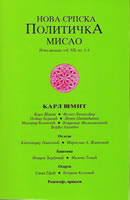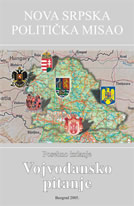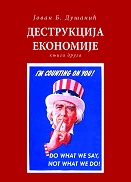| NSPM in English | |||
Serbia's next move |
 |
 |
 |
| уторак, 11. март 2008. | |
|
Though ministers rejected the motion by 15 votes to seven, Kostunica insisted that the government could no longer function because "there was no united will to clearly and loudly state that Serbia can continue its path toward the EU only with Kosovo" and because he "no longer had confidence in the sincerity of our coalition partners, the Democratic Party (DS) and G17 Plus, to battle to preserve Kosovo". In response, the Serbian president, Boris Tadic, has agreed to call an early general election, scheduled to take place on May 11 alongside municipal elections, as the most "democratic way to overcome the political crisis". Tadic has consistently reiterated that Serbia can "best defend our Kosovo from independence precisely with membership in the European Union" and therefore confirmed that he would "sign the stabilization and association agreement (SAA) with the EU immediately if offered". For Kostunica, however, "all parties want Serbia to join the EU, but the question is how - with or without Kosovo". With respect to the SAA that Serbia initialled in November, Kostunica queries how EU member states that have recognized Kosovo's independence can possibly accept an agreement whose text reaffirms that " Serbia is a whole state with Kosovo in its borders". The forthcoming election battle will be primarily framed around this key issue and articulations of Serbia's future direction. The DS, G17 Plus and the Liberal Democrats (LDP), the main advocates of EU membership, believe that the issues of Kosovo and further EU integration are unrelated, and have therefore vehemently opposed the SRS's resolution. In an attempt to articulate this dual course of deeper EU ties whilst upholding Serbia's territorial integrity, Tadic has speculated how, as an EU member, Serbia could possibly prevent other countries from becoming members, i.e. "we could prevent Kosovo from joining". Such remarks are consistent with the Democratic Party's stance that Serbia's territorial integrity is best protected by signing an SAA with the EU; a stance that was reaffirmed throughout the recent Presidential campaign. These elections will provide another stern test for the European perspective in the western Balkans. Though much was made of Tadic's re-election as a clear choice for a European future, early elections are likely to provide a clearer picture of Serbia's current national sentiment. While Olli Rehn, the EU's commissioner for enlargement, continues to insist that, "a great majority of Serbian people consistently support EU membership" and that "it should be a realistic expectation that the Serbian government listens to this silent majority", a recent opinion poll shows that although 67% of Serbian citizens support EU integration, 74% would not trade further integration for recognition of Kosovo's independence. It is therefore highly questionable as to whether the "silent majority" of which Rehn speaks actually exists in light of the widespread recognition of Kosovo's independence by EU member states. Serbia's education minister, Zoran Loncar, recently called on Rehn to clarify whether or not the EU observes Serbia's "internationally recognized borders", which would include Kosovo. Instead, the EU has merely acknowledged Kosovo's unilateral declaration of independence and left individual member states to decide on recognition in line with their own national procedures. The EU's functional incapacity to recognise states, combined with the lack of a unified stance on Kosovo's status among member states, means that Rehn cannot possibly provide the clarification demanded. On the basis of parliamentary election results from January 2007 and political developments since then, the SRS will likely benefit most from new elections. Tadic and the Democratic party face the formidable challenge of convincing the Serbian electorate that their dual approach of EU integration and opposition to Kosovo's independence is not beset by inherent contradictions, but instead constitutes the strongest path for Serbia to follow. In the prevailing political climate, however, such a strategy and discourse will be severely tested. If the EU again chooses to implicitly support Tadic and Serbia's more pro-European voices, as it did prior to February's presidential run-off, then it should tread extremely carefully. http://commentisfree.guardian.co.uk/ian_bancroft/2008/03/serbias_next_move.html |
Од истог аутора
Остали чланци у рубрици
- Playing With Fire in Ukraine
- Kosovo as a res extra commercium and the alchemy of colonization
- The Balkans XX years after NATO aggression: the case of the Republic of Srpska – past, present and future
- Из архиве - Remarks Before the Foreign Affairs Committee of the European Parliament
- Dysfunction in the Balkans - Can the Post-Yugoslav Settlement Survive?
- Serbia’s latest would-be savior is a modernizer, a strongman - or both
- Why the Ukraine Crisis Is the West’s Fault
- The Ghosts of World War I Circle over Ukraine
- Nato's action plan in Ukraine is right out of Dr Strangelove
- Why Yanukovych Said No to Europe

.jpg)








 The Serbian government has collapsed in the face of widening divisions over the country's future ties with the EU. A parliamentary resolution tabled by the Serb Radical party (SRS), the largest party in the Serbian parliament, and publicly supported by Prime Minister Kostunica, calling on the EU to "clearly and unequivocally" confirm Serbia's territorial integrity before further accession negotiations begin has further split an already dysfunctional governing coalition.
The Serbian government has collapsed in the face of widening divisions over the country's future ties with the EU. A parliamentary resolution tabled by the Serb Radical party (SRS), the largest party in the Serbian parliament, and publicly supported by Prime Minister Kostunica, calling on the EU to "clearly and unequivocally" confirm Serbia's territorial integrity before further accession negotiations begin has further split an already dysfunctional governing coalition. 












